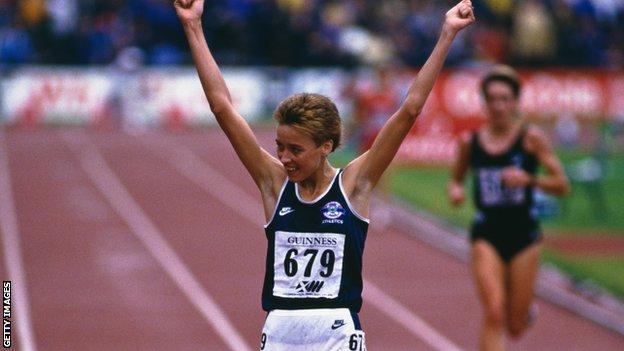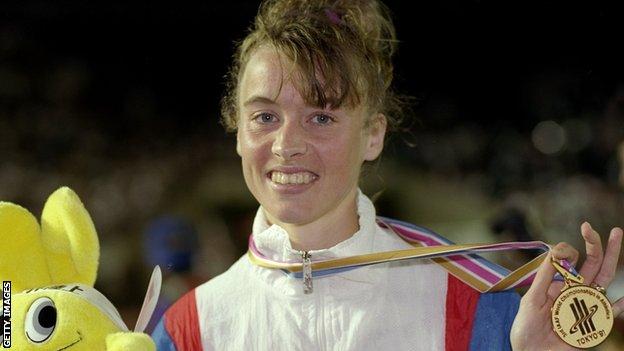
[ad_1]
Throughout July, BBC Scotland’s Sporting Nation series is reflecting on some of the greatest feats and personalities from Scottish sporting history. Here we look at Liz McColgan and her 10,000m victory at the 1991 World Championships in Tokyo.
“The greatest run in the history of British distance running, man or woman, any time, any place, anywhere – that’s the best I’ve seen and it’s better than any I’ve ever read about.”
Brendan Foster is in awe in the commentary box. Liz McColgan of Dundee Hawkhill Harriers has made history in front of his eyes. She has battled through Tokyo’s heat and humidity to dominate one of the finest women’s long-distance fields ever assembled.
Nine months after giving birth to daughter Eilish, McColgan is a 10,000m world champion.
Though the settings changed down the years, running was a constant in her life. She ran every day from the age of 11.
Instead of a starting pistol, however, her runs back then were signalled by the door slamming shut at her council home on the Whitfield estate, Dundee. Running was an escape for her, both literally and figuratively, from the harsh surroundings and circumstances of her formative years.

At 16, she was placed in a jute factory as part of a junior training scheme, clocking in at 5.30am, but Liz Lynch, as she was then, was already determined to put long-distance between herself and Whitfield.
A year prior, her first coach Harry Bennett had told her that an Olympic gold was within her grasp, but here she was breathing in dust and dirt from the fabrics at the factory. For her own sake, and for the sake of her future family, she had to get away.
Making a splash across the pond
An opportunity presented itself to go to the United States as part of a sports scholarship in Idaho, and when her parents couldn’t afford it, Bennett and an uncle provided the funding to send her on her way.
“It was the last time I ever saw Harry,” she said in a BBC interview in 1995. “He died when I was out there, he died when he was out running.
“Harry was like a second dad. I thought that I wouldn’t run again. But my dad said that I had the talent and that Harry wouldn’t have wanted me to just stop running.”
Her career began to blossom across the pond, with her best result a win in the mile at the 1986 National Collegiate Indoor Championships. Shortly after, she was barred from competition due to an unwitting breach of prize-money laws and returned to Scotland with real intent.
The 22-year-old was a silver lining in a largely bleak picture for the host nation at the 1986 Commonwealth Games in Edinburgh, winning Scotland’s only athletics gold with victory in the 10,000m.
Scottish Athletics had found an emerging star, and when the 1988 Olympics came around, McColgan looked as though she would once again stand at the top of the podium.
Leading the field with 200m to go she was heading for glory, but Olga Bodarenko of the Soviet Union produced a powerful sprint finish, McColgan could not hold on and had to settle for silver.
Though it was viewed as a fantastic achievement by most, McColgan felt she had messed up. She immediately set herself a new target – to right that wrong at the 1991 World Championships in Tokyo, to turn silver into gold.
‘To achieve all your goals, it doesn’t happen very often’
Things seemed to be going smoothly when she retained her Commonwealth gold in Auckland in 1990, but that year she received some surprising news.
“I was three and a half months pregnant before I knew I was pregnant,” she recalls. “Eilish was unplanned and it was quite a shock but I really wasn’t prepared to have a child that year and so my running was very much foremost in my mind.
“I was training 100-odd miles a week… I trained right up until I had her.”
And less than two weeks after giving birth, she was back in training. Nothing was going to stop her.
In Tokyo she lined up alongside Ingrid Kristiansen, Elana Meyer and Deratu Tulu – stars of women’s athletics and all world champions at some point by the end of their careers.

McColgan remembered the feeling of falling just short in 1988. She knew she had to run harder, be mentally tougher, and put three years of training into action.
She led almost from start to finish, and though Tulu overtook her towards the end of the race, the Dundonian instantly surged back in front and held out to secure gold.
“It was probably the best race I ever ran, with the amount of pressure on me and that I put on myself more than anything,” McColgan said.
“For it all to play out and come to fruition like that and to achieve your goals, it doesn’t happen very often in sport. It was the highlight of my career.”
That same year she travelled to the United States and won the New York Marathon, purely to prove a point to one of the race organisers who believed she was not capable of doing so.
She was awarded BBC Sports Personality of the Year following those two victories, towering above Will Carling and Gary Lineker on that particular podium.
It was time to celebrate and commemorate. The 11-year-old girl who started running for her life on those cold Dundee nights had changed her future and her family’s future immeasurably. What more could she want?
She gave the after-party a miss. She wanted to get up for training the next day. She wanted to go out and do it all over again.
[ad_2]
Source link